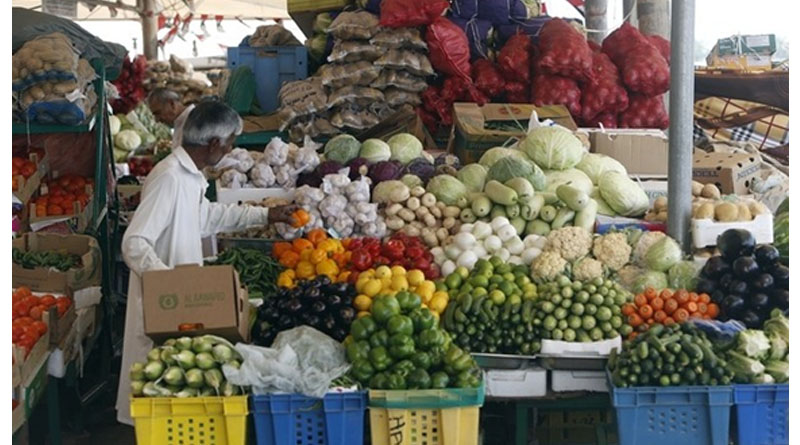Middle East Fruit and Veg Ban Means Higher Prices for UAE Consumers

Image Caption: From May 15, sellers will have to stock their shelves with foods from other countries to fill the gap. Ravindranath K / The National
DUBAI // Food prices are set to surge after a ban on the import of fruits and vegetables from five Middle East countries, amid fears of high levels of pesticide.
Produce from Egypt, Oman, Jordan, Lebanon and Yemen were banned on Monday.
From May 15, sellers will have to pay more for food from other countries and more to import it – increases that will be passed on to customers.
“We usually get carrots from Oman for Dh1.50 a kilogram, but now we will have to get them from China or even Australia where it is Dh3.50 a kilo,” said Shokrollah Ali, managing director of Shokri Hassan Trading at Dubai’s Fruit and Vegetable Market.
“Lebanon and Jordan are important countries for us because they bring a lot of vegetables, such as lettuce and marrow.”
Marrow, which usually costs Dh3 a kilo if it comes from Jordan, will now be sold for up to Dh10, Mr Ali said.
“We usually get it by land from Jordan and it takes five days,” he said. “But now it will not be possible to get it by sea or land.
“We will have to fly it in from Holland, Australia, Tunisia or Morocco and air freight can add more than €1 [Dh4] a kilo from Europe or US$1 from Morocco.”
Mr Ali said the extra cost would be borne by customers.
“The further the country, the higher the price,” he said. “It generally affects the customers more and now we will have to revert to Europe or Africa.
“But they have to sort this out quickly, especially before Ramadan, because there are more requests for produce during that time and customers will end up paying 50 to 70 per cent more.”
Shavanas K M, sales manager at Barakat Vegetables and Fruits, said: “It will be more expensive because there will be no other option.
“We have to get these items from Holland now by air only so the price will be very high because it includes freight charge, service and air conditioning.”
A kilo of lettuce, which would usually cost Dh4.50, is expected to be more than triple that price – between Dh15 and Dh20.
“It’s a huge difference,” Mr Shavanas said. “Most products will be double the price or Dh10 to Dh15 more so food costs will be high for consumers.
“We don’t know what to do but we will most probably only get produce on demand from our customers.”
He said the ban would pose problems during Ramadan as most people used leafy vegetables in meals, almost all of which came from the Middle East.
Shoppers expressed their frustration at the surge in prices.
“It’s hard enough to access good quality produce in the UAE so having a ban on a lot of countries that provide us with fruit and vegetables is not going to be easy,” said Mariam Hazem, from Jordan. “Prices are already quite high for such items so paying more for food that will be less fresh is not ideal.
“I’m sure it’s for our well-being but there should be measures in place to protect consumers and avoid having them absorb these price hikes.”
Mohammed Asif, a shopkeeper at the fruit and vegetable market in Abu Dhabi, said local produce would run out by the time summer hit.
“Seventy to 80 per cent of our stock was expected from Jordan,” Mr Asif said. “We didn’t even look at other countries because Jordan gives us produce at a very good price.
“So if this is banned, it will be a problem for us. Other countries charge almost double.”
Experts said there was a good reason for the ban, imposed by the Ministry of Climate Change and Environment.
“It’s a big risk to consume vegetables, especially leafy greens, with a high dose of pesticides because we are consuming chemicals,” said Basem Azzam, quality director at Taylor Shannon International, a food safety consultancy.
“Those that have a peel like watermelons aren’t at risk because we don’t eat the peel, but others, like apples, are, so we should not eat such contaminated produce.”
Mr Azzam, whose company advises Sharjah and Ajman municipalities, said the World Health Organisation required every country to have a set of regulations for the maximum amount of pesticides used in produce.
“They differ from country to country and so far there is no international agreed number,” he said. “In Europe, they have EU numbers but Germany has stricter regulations.”
Banned produce are all varieties of pepper from Egypt; peppers, cabbage, cauliflower, lettuce, squash, beans and aubergine from Jordan; apples from Lebanon; melons, carrots and watercress from Oman; and all fruit from Yemen.
Detecting the type or amount of pesticides from the thousands available is tricky as it requires sophisticated laboratories, Mr Azzam said.
“It will affect sellers but there will be other suppliers from other countries and we recently started importing tomatoes from Saudi Arabia and Morocco.
“So other countries will be involved but this is a very good step from the ministry because the Government looks first of all at people’s health.
“Pesticides can cause cancer and other real long-term problems so it’s a great decision to prevent them.”
*With additional reporting by Mahak Mannan
(Source: TheNational.ae)



